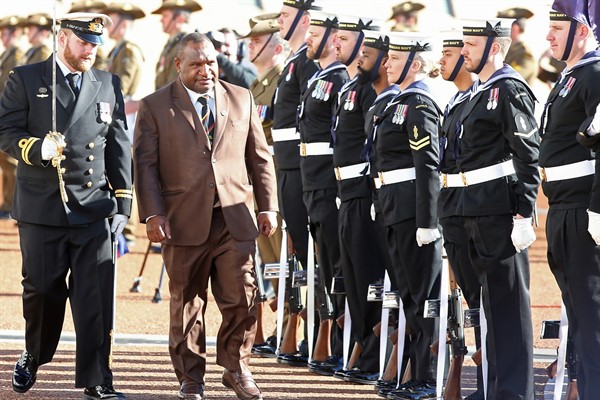Nov. 13 began much like any other day in Waigani, the suburb of Port Moresby that houses Papua New Guinea’s unicameral Parliament. Much of the chamber sat empty while Prime Minister James Marape answered questions from the governor of Western Province about the national government’s plans to subsidize rubber production. Suddenly, former army captain Belden Namah, a longtime critic of Marape, swept into the hall to take his seat as opposition leader. He was flanked by a surprising array of senior lawmakers, including Marape’s own deputy prime minister, Sam Basil, and his foreign minister, Patrick Pruaitch—both of whom had expressed frustration with the government’s economic performance, especially its mounting debt.
By crossing the floor, Basil and Pruaitch announced a serious challenge to Marape’s leadership—one that gave Namah sufficient support to seize control of Parliament and suspend legislative sessions until Dec. 1. At that point, the opposition could hold a vote of confidence, as Papua New Guinea’s constitution stipulates that new governments can be toppled in Parliament after 18 months in office. Marape is no stranger to such dramatic shifts in allegiance, having ascended to power in May 2019, after defecting from the Cabinet of his long-ruling predecessor, Peter O’Neill, and winning the support of Parliament to replace him as leader.
Namah’s gambit sparked a procedural jousting match, including a dubious effort by Marape ally Job Pomat, the speaker of Parliament, to reconvene the chamber on short notice and pass a 2021 budget before adjourning until April in order to forestall the planned no-confidence motion. The Supreme Court earlier this month declared that move invalid, dealing a setback to Marape’s hopes to stay in power. In the end, however, the no-confidence vote never materialized, as the opposition coalition fell apart. After Basil narrowly lost to Pruaitch in a secret opposition ballot to nominate Marape’s would-be successor, Basil returned to Marape’s side along with a number of other MPs, allowing the prime minister to wrest back control.

